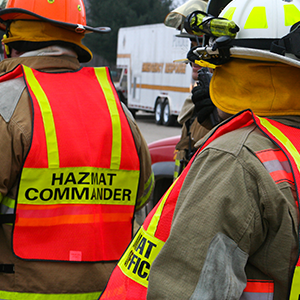
Emergency Management
Prepare, Respond, Recover
Professionals in Emergency Management prepare for, respond to, and protect the US from natural and manmade threats. These experts work to predict, plan, train and respond to natural disasters such as wildfires, earthquakes, and floods, and to protect our borders, critical infrastructure, airports, and seaports.
Emergency management programs at MVC offer education in a critical, in-demand field with career options in healthcare, public safety, fire response, civil service, business, and more.
Programs of Study
New Bachelors of Science Coming Fall 2026
-
BBachelors Degree
-
AAssociate Degree
-
TTransfer Degree
-
CCredit Certificate
-
NNon-Credit
-
Limited Enrollment
-
Online Options
-
Zero Textbook Cost
The Emergency Management and Homeland Security program prepares students to enter
the emerging profession of homeland security and emergency management. The curriculum
is designed to provide the learner with a foundation of technical and professional
knowledge to meet local, state, and national safety responsibilities both in the public
and private sectors. The program emphasizes an All-Hazard approach to emergency planning
and management, with courses in preparedness, planning, risk mitigation, emergency
response and disaster recovery.
Program Code
MAS1014/MCE1014
Coming fall 2026, MVC will launch a bachelors of science in emergency management.
This will include 60 units of upper division coursework and internship or capstone
project opportunities.
Program Code
The concentration in Cybersecurity prepares cyber security professionals to operate
in the complex world of emergency management and homeland security.
Program Code
MAS1015/MCE1015
The concentration in Emergency Medical Services prepares pre-hospital providers to
operate within the emergency medical services branch of the Incident Command System.
Program Code
MAS1016/MCE1016
The concentration in Fire Technology prepares fire service professionals to operate
within the fire branch of the Incident Command System.
Program Code
MAS1017/MCE1017
The concentration in Law Enforcement prepares law enforcement professionals to operate
within the law branch of the Incident Command System.
Program Code
MAS1018/MCE1018
Why Emergency Management
Advanced skills in emergency management help you prepare for, respond to, and recover
from critical incidents. Plus, you can enhance your current career or ready yourself
for a career in law enforcement, the fire service, emergency medical services, cybersecurity,
industrial and private security, and more.

Learn Important Skills
- Explore and examine emergency response local, state and national response efforts
- Gain the skills to respond to critical incidents and assist with disaster recovery
- Discover how to prepare you, your family, community and workplace for critical incidents
- Learn the tools needed to create comprehensive emergency plans
- Examine how technological threats may impact the US
- Examine critical homeland security issues from natural to man-made

Possible Careers
- Homeland Security
- Emergency Management
- Law Enforcement
- Firefighting
- Emergency Medical Services
- Local and State Governments
- Law and Policymaking
- Transportation Security
- Private and Industrial Security
Courses and Topics
- Course Name: HLS-101 Introduction to Emergency Management
- Course Description: An introduction to the fundamental aspects of emergency management. It examines the roles and responsibilities of government and non-profit agencies when responding to disasters and emergencies with emphasis on man-made, natural, and technological events most likely to affect the United States. The course emphasizes the four concepts of emergency management: preparedness, mitigation, response and recovery. 54 hours lecture. (Letter grade only)
- Units: 3
- Course Name: HLS-1 Introduction to Homeland Security and Terrorism
- Course Description: This introductory course explores the history, development, and organization of homeland security in the United States. It examines the roles and functions of the various components of the Department of Homeland Security and its relationship to state and local agencies. Topics include the threat of terrorism and countermeasures, the importance of the intelligence community, and the way government systems can effectively prepare and respond to security threats on American soil. Emphasis is placed on homeland security practices of the emergency manager. 54 hours lecture. (Letter Grade only)
- Units: 3
- Course Name: HLS-2 Preparedness for Emergencies, Disasters & Homeland Security Incidents
- Prerequisites: HLS-101
- Course Description: The theory and practice of basic preparedness for major incidents such as terrorist attacks, disasters both natural and manmade. Students will receive a comprehensive examination of mitigation and preparation from a multi-disciplinary perspective. Specific topics of discussion include trainings and exercises, supplies and equipment and necessary documentation. 54 hours lecture. (Letter grade only)
- Units: 3
- Course Name: HLS-3 Response to Emergencies, Disasters & Homeland Security Incidents
- Prerequisites: HLS-101
- Course Description: The theory and practice of response to major incidents such as terrorist attacks and disasters both natural and man-made. Students will undertake a comprehensive examination of response structure from local, state and Federal agency perspectives. Specific topics of discussion include differences in roles and responsibilities, Incident Command System, communication among response agencies and the role of volunteer agencies in response. 54 hours lecture. (Letter Grade, or Pass/No Pass option.)
- Units: 3
- Course Name: HLS-4 Recovery in Emergencies, Disasters & Homeland Security Incidents
- Prerequisites: HLS-101
- Course Description: An introduction to recovery issues that may ensue following a disaster, emergency, or homeland security incident. Students will conduct a comprehensive, examination of recovery from a multi-disciplinary perspective. Specific topics of discussion and analysis include recovery planning, supplies and equipment and necessary documentation. 54 hours lecture. (Letter grade only)
- Units: 3
- Course Name: HLS-5 Investigation of Emergencies, Disasters & Homeland Security Incidents
- Prerequisites: HLS-1 and HLS-101
- Course Description: Instructs First responders, emergency personnel and community members in the theory and practice of basic investigative techniques, challenges and strategies for major incidents such as terrorist attacks, manmade and natural disasters. Students will receive a comprehensive examination of investigation from a multidisciplinary perspective. Specific topics of discussion include different types of investigations, legal issues, resources and necessary documentation. 54 hours lecture. (Letter grade only)
- Units: 3
- Course Name: HLS-6 Case Studies Emergencies, Disasters & Homeland Security Incidents
- Prerequisites: HLS-1 and HLS-101
- Course Description: An introduction to case studies of historical emergencies, disasters and Homeland Security incidents and how they relate to preparedness for future events. Students will focus on a variety of case studies from an all-hazard, multi-disciplinary perspective. Students will examine case studies covering both current and historical events, including disasters and terrorist events, and responses at local, state, national and international levels. Students will evaluate the lessons learned from these events and their impact on society and current policy. 54 hours lecture. (Letter grade only)
- Units: 3